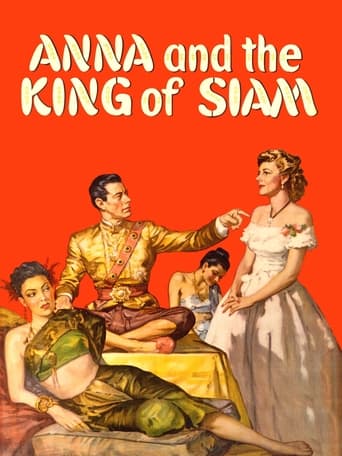jjnxn-1
Solid drama that was the genesis for The King and I is much darker in tone than the later musical. Rex Harrison and Irene Dunne do well by their characters and Lee J. Cobb is appropriately brusk as the king's right hand man. Gale Sondergaad is compassionate and regal as the number one wife. Linda Darnell perfectly haughty and full of youthful pride as the tragic Tuptim. Her fate is quite different than the one meet by Rita Moreno in the musical. This is the picture during which she was slightly burned during filming leading to her lifelong fear of fire, a sad irony since that was to be her end. A very good film but if you enter into viewing it expecting a similar experience to the Yul Brynner/Deborah Kerr picture you're in for quite a shock.
abcj-2
I watched this film because I'm such a fan of Irene Dunne, particularly in her light-hearted romantic and screwball comedies. There are some amusing situations, but this is ultimately a drama and certainly not a lavish musical. It still, to me, is the best version of them all.This film hits hard right out of the gate with Anna and her son caught in a situation that neither quite expect. Rex Harrison plays the King surprisingly well despite not looking as exotic as Yul Brenner or as truly authentic as Yun-Fat Chow. Dunne's determination and caring for her son spur her on and make her brave and strong in an understated fashion as the film progresses. The main characters repartee is a delight to witness. Their chemistry is just right, and they do not have the luxury of lavish musical numbers to draw them together. One just knows they have a great respect for each other from very fine acting. I will say that I found this version the most emotionally charged of the three motion pictures, yet it is not a Peyton Place melodrama. Maybe that's why I love it so. It's so well-made in every aspect that it really packs that emotional punch for me. I didn't even recognize the usually very recognizable Lee J. Cobb and somehow missed his name in the credits the first time. I think this is about as fine an epic drama about forbidden romance and opposing cultures as I've seen. I give most of that credit to the wonderful performances of the leads and the incredibly adept script. It entertains, tugs at your heartstrings, and doesn't disappoint. I highly recommend it as the best version of them all:)
jotix100
Based on the memoirs of Anna Leonowens, an English woman that went to Siam as a teacher to the royal family of the then King Mongkut, gave way to Margaret Landon's novel that served as the setting for the 1946 Twentieth Century production. It was 1862 when the action occurs. The kingdom of Siam is breaking from its splendor into what became the modern Thailand. It must have been a quite a cultural shock for an educated woman facing an exotic land she knew nothing about.The original film was directed by John Cromwell who gave the material a lavish treatment. Talbot Jennings and Sally Benson adapted Ms. Landon's book into a film that even by today's standards can stand against the other versions of the novel. Of course, the Rogers and Hammerstein's musical "The King and I" was a glossy account of what had been achieved in a film with less. Who can forget Yul Brynner in the role? Comparisons do not take into account what was achieved by Mr. Cromwell.Irene Dunne was always a reliable actress that gave excellent portrayals of whatever she was asked to play. It is a pleasure watching her in the role of the woman that had the resolute spirit to stand for what she believed, even if she had to speak her mind to a king. Rex Harrison's king, while not as strong, still shows an actor that knew how to convince us he was that strange individual, cruel, as well as generous. The combination of Ms. Dunne and Mr. Harrison paid off well.The great Lee J. Cobb shows up in a supporting role. We had trouble placing him with the dark looks he was given for his part. Linda Darnell is Lady Tuptim, the girl that goes from being a favorite to being rejected by the king. Gale Sondergaard appears as the disgraced wife that only wants to have the crown prince learn from Anna.The cinematography is by Arthur Miller who produced vivid images of a phony Siam appear real. Bernard Hermann's musical score works well in the picture. John Cromwell directed with style and got excellent results from the large cast. See the film for what it is and do not compare it with what came out later. This was the original!
edwagreen
Irene Dunne and Rex Harrison gave compelling performances in the 1946 film. The trouble is that the film is much too talky. Sociologists would have a field day with this one with Harrison, as the ruler of Siam, who realizes that the country needs to change to modern thinking but is unable to do this and acts barbaric in the way he dealt with an unfaithful Linda Darnell and her priest friend.At least, the remake with Deborah Kerr and Yul Brynner broke up the talking with fine musical interludes. Ironically, Dunne, who could sing very well, was not cast in the 1956 production probably because she was aging.(8 years after this she was campaigning for Goldwater.)Surprisingly, Dunne and Harrison both failed to receive Oscar nominations and the picture was ignored by the academy as well. The one surprising nomination was by Gale Sondergaard in the supporting category for her portrayal of the much ignored wife of Harrison. As interesting as her performance was, Sondergaard was no match for the winner that year-Anne Baxter, totally brilliant in "The Razor's Edge." In the 1956 film Sondergaard's part was totally written out.As Harrison's adviser, Lee J. Cobb was excellentObviously, the ending in the '46 film was far more serious and sad. Dunne sure knew how to let those tears flow in the same vein as Katharine Hepburn. Wonder if Hepburn were considered for the part of Anna Owens?





